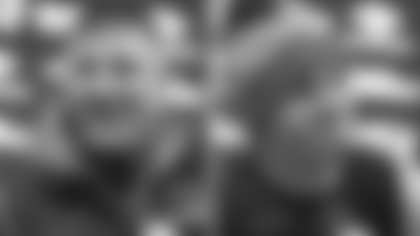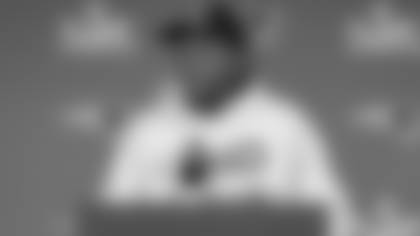PATRIOTS HEAD COACH BILL BELICHICK
BB: Alright, division game. It's a good opportunity this weekend.
Q: Is a team like Miami particularly tough to prepare for? It seems like they don't have a true No. 1 receiver in the passing game, with most of those throws being evenly distributed among four or five guys.
BB: Yeah, like any good passing team, it's whoever's open. Yeah, they do a good job of putting pressure on you and getting to the open guy. They're all dangerous - backs, tight ends, receivers. Coach [Adam] Gase does a good job with the scheme. The quarterback does a good job reading it. You've got to defend all of them. You can't just stop one guy.
Q: How difficult is it to lose Ja'Whaun Bentley and Rex Burkhead to Injured Reserve?
BB: It's unfortunate for both players.
Q: At this point, do you have any expectations as to whether they'd be able to return this year?
BB: Yeah, we'll see. I don't know. It won't be for a while.
Q: What have you seen from Nicholas Grigsby from where he was in the preseason to now?
BB: Well, he's a lot further ahead because of his opportunity to, again, start from scratch at the beginning of the year in the offseason program, OTAs, training camp as opposed to coming in whenever he did last year - November. He's much further ahead, had a better opportunity to learn the defense, to get reps in it and to play in the preseason. So yeah, he's earned some playing time based on that.
Q: What went into the decision to sign John Simon? What have you seen from him throughout his career?
BB: We felt that based on our situations he was the best player available for our team.
Q: Has he had some versatility throughout his career?
BB: He's played on defense. He's played in the kicking game. He played in a couple of different systems. We'll see.
Q: What could you point to about Matt Light to show your current players what it is that has made Matt Light a Patriots' Hall of Fame member?
BB: Yeah, I've talked a lot about Matt Light to our players. Matt had a great career, worked hard, really tough kid mentally and physically. He had a lot of other qualities but I'd say those two were outstanding.
Q: Are there any good Matt Light stories that you could share from his career?
BB: We'd be here all day. Yeah, sure. We could put a book together of Matt Light stories.
Q: Is the key to stopping Miami's big-play ability on offense just everyone staying disciplined and focusing on what they need to do?
BB: Exactly. Yeah, well-put. We'll bring you in there to talk to the defense about it. Yeah, and you can't stop one guy. They attack you at all different points horizontally and vertically, so if you're deep you've got to be deep. If you're outside, you've got to be outside. If you're inside, you've got to be inside. As soon as you put too many players in one spot they go somewhere else. That's the way those 50, 60, 80-yarders come from. Discipline, tackling, leverage - those are all critical.
Q: Have you seen an improvement from Lawrence Guy in his second season here?
BB: Yeah. I think Lawrence has done a really good job for us in a lot of ways on and off the field. Run, pass, technique, communication. Yeah, he's been a really valuable player for us.
Q: It seems like he's been pretty disruptive up front.
BB: He's a hard guy to block and he's big. He uses his hands well. Again, he's an instinctive player. He recognizes blocking schemes and play-action and things like that. Yeah, he's done a good job. He works hard and he's gotten a lot better.
Q: What have you seen from Cordarrelle Patterson at the wide receiver position?
BB: Well, just in general, we need to improve our passing game. There's a lot of things we need to improve but that's really everybody, so we're all working hard at it. Coaches, quarterbacks, receivers, tight ends, backs, protection, everything. Hopefully we can improve it. CP [Cordarrelle Patterson]'s a big part of that, but so is everybody else. That's all the way across the board.
Q: Have you been pleased with what you've seen from Josh Gordon on the practice field so far?
BB: Yeah, Josh is working hard on and off the field. He's done everything he can do.
Q: Do you have a sense if he'll be ready to play this weekend?
BB: We'll see.
Q: How beneficial do you think Adam Gase has been in Ryan Tannehill's development?
BB: You'd have to ask them. I'm not sure. I mean, Adam's a good coach. He does an excellent job. His teams have always played well. They're always good offensively. He does an excellent job of game planning. His teams play well fundamentally. The exact nature of their relationship - you'd have to talk to them about that. But he's a good coach. There's no question about that.
Q: What have you seen from Ryan Tannehill from when he entered the league to where he is right now as the second-longest tenured quarterback in the division?
BB: He's a good player. He's been a good player, he's still a good player. Obviously, players get better with experience but he does everything well. He makes good decisions, gets the ball to his skill players, makes key plays in close games to help them win. That's the bottom line. Get your team to the winner's circle. That's what he does a lot of. That's really what it's about.
Q: How dangerous is his ability to scramble and get out of the pocket?
BB: Yeah, he's good at it. Not just getting out of the pocket - they use him on quarterback-running plays, read-zone plays, things like that, bootlegs, moving-pocket plays. So yeah, all of the above. If you don't contain him he can hurt you running. If you do contain him he can hurt you passing. It's another weapon they have. Instead of covering five receivers, you've really got to cover six because you've got to deal with him.
Q: When you're teaching pass-rushing, are there times where it's not a bad thing to go beyond the quarterback? Is there a threshold where a pass-rusher needs to stay in order to keep the passer in the pocket?
BB: Fundamentally, why would you want to be behind the quarterback?
Q: I imagine that you wouldn't.
BB: What are you going to do back there? Bat the ball? What are you going to do from behind him? Not much.
Q: So generally a scheme wouldn't dictate for a player to be back there? You would want to keep them in front of the quarterback?
BB: I don't know what a player can do from back there except chase him. Then somebody would have to slow him down so you could catch him. You'd be playing with ten players. Now, you know, if you're close enough to him and you can force him by being tight and forcing him up into the pocket, I mean that's not really being behind him. Maybe it's a matter of semantics, but you're putting enough pressure on him so you can force him into other players. That's one thing, but to run past him and be behind the quarterback, I couldn't tell you how that helps the defense. Maybe you could explain that to me. I don't know, but I don't know what value that is to just stand five yards behind the quarterback. What are you going to do from back there? Now it's not a great spot on the field to be. Out-of-bounds isn't a great spot on the field to be on defense. So no, those aren't in our highly recommended list.
Q: You've got some smaller running backs like Kenjon Barner and James White behind Sony Michel. Would you be confident if they had to take on a bigger role on early downs?
BB: Yeah, I think all of our backs are productive, would be productive. Yeah.
Q: What have you seen from your running game, in particular the blocking up front?
BB: As I said, we can improve everything - running game, passing game, all parts of it. Being more consistent; that would be the No. 1 thing.
Q: Are the Dolphins pretty much splitting carries down the middle between Kenyan Drake and Frank Gore or is it a constant guessing game for your defense?
BB: Yeah, again, a lot of their plays are checked at the line. Both guys are going to be in there. Both guys are going to get the ball. I don't know if they have it set for a certain distribution, but I would say I doubt it because if you line up in a defense that takes away the run then you can't just stand there and run it and get clobbered. If you line up in a defense that takes away the pass and they can hand it off, they'll hand it off. I don't think they care which guy is in there. So there's an element of that. In the read-zone plays, if you close down and take the running back, then the quarterback is going to keep the ball. If you don't, then he's going to hand it off. There are plays that are discretionary in one way or another to the quarterback or the quarterbacks line of scrimmage procedure that they don't even know who's going to get the ball until something happens, which is a good way of doing things. I'm just saying, this is not like, "We're going to call ten runs to this back and nine runs to this back and throw the ball six times to this receiver." That's not how the offense works at all. The guys that are open get the ball. Everybody's in a spot. Whoever has the least guys around him or however the play is read, the quarterback makes a decision to get the ball to the guy who has the best opportunity and he does an excellent job of that and they have a lot of good skill players. I would say wherever you are, that's probably where the ball is not going. Wherever you're not, that's probably where the ball is going regardless of who it is. I don't know if they really care who gets the ball. It looks like they'll give it to anybody, throw it to anybody. So you've got to defend all of them including the quarterback.
Q: The defensive players have said this week that 11 guys have to be on the same page to play sound defense. Is that especially important against Miami because they do so many different things offensively?
BB: I think it's just what the players said. Yeah, it's important every week. It's important this week. It's going to be important next week. It was important last week. Having everybody in the right spot, reading our keys, having the defense properly coordinated from a coaching standpoint to be able to handle the things that they do. All of those things are important. If any of them are out of sync then fundamentally you have a problem and then you've got to play with good fundamentals and technique and leverage.
Q: It seems like Miami can expose those things quickly.
BB: Well yeah, we've just talked about that. That's their offense. That's what they do. They put guys in different spots on the field that create space and whichever spot you have the fewest guys or the furthest away then that's usually the guy that gets the ball.
Q: When preparing for a game plan team, is there any value in looking at a staff's previous stops and how they might have played you in the past? For example, Adam Gase when he was in Denver or are those concepts just too far in the past and aren't applicable to this Sunday?
BB: They could be or they could not be. It would depend on, I would say, what they're doing and what you're doing. If what they were doing at another point in time is similar to what they're doing now then those concepts may be applicable. If you're doing something similar to what you were doing then, those concepts may be applicable. If they're doing different things and you're doing different things, I don't think they're going to change their offense because of something they did five years ago or think that we're going to change our defense to something that we did five years ago. I just don't think that's the way it works. If there's correlation and carryover, then that would probably be relevant. If there isn't, then there isn't. It's no different than looking at the team you played the week before or two weeks before or three weeks before. If you see continuity and carryover in that, the way another team plays and the way they attack that team or vice versa, then great. Sometimes it's totally different so they're using a totally different method of attack or a substantially different method of attack based on what's going on on the other side of the ball. Well, if you do that then there's an element of that that'll be relevant to you. If you don't do that then I'm not sure how much of that you're going to see. And sometimes that gets segmented, so you could be totally different in first and second-down but similar in third-down. Or you could be similar in goal line but different in third-down. I would say usually when you watch one team play another team you can find something that is relevant. So if they watch Detroit, or Jacksonville, or Houston in our games they would look at that. I'm sure they would find things that are relevant to what they would do, and they'll find some things that are, "Well, this is what they do. We don't really do that, so let's move on to something else." We do the same thing. I'd say that's basically how it works, so could there be something from five years ago? Yeah, there could. It'll just depend on what the circumstances were in that time, how similar they are to where we are currently.
Transcripts are provided by the Patriots media relations department as a courtesy to the media and are edited for readability. All press conferences are posted and archived in their entirety at patriots.com.




































